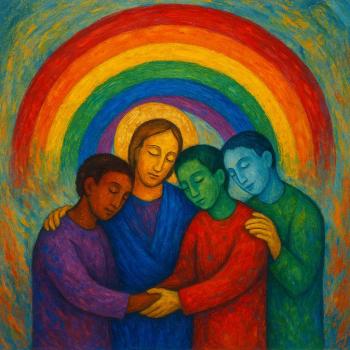
Chapter 53: The Reception of Guests
The Rule of Saint Benedict is quite clear when it comes to guests. Borrowing from Matthew 23:25, this chapter opens that all guests are to be welcomed as Christ. I find the wording of Matthew 23:25 and the use of this verse theologically significant as to how we are to treat guests. In other places, for example in the transfiguration story, we get a vision of Moses and Elijah, but here, we are called to open our hearts to potentiality of Christness in our guests. In my spiritual walk, I equate Christness as divine love and see Jesus as a figure who had such a profound relationship with God, that we cannot distinguish the two from each other. All people are potential seats of Christ.
Jewish Notions of Stranger
The Old and New Testaments are full of stories about people being welcomed into people’s homes, people caring for sick people and many stories about community. While from a Christocentric viewpoint, we may point to Jesus in the New Testament and prophecies pointing to Jesus in the Old, the explanation is a bit simpler. The Old Testament largely is the cannon of scriptures used by the Jewish people, of whom Jesus was a part of. It would make sense then that many of the stories in the New Testament look Jewish.
Hospitality is an integral element of the spirituality in the Jewish faith. The Talmud tells us that welcoming guests is “greater than welcoming the Divine Presence [Shekhinah].” In Hebrew, hospitality is known as hakhnasat orchim and is recognized as the most important value in Judaism. This is clearly evident throughout the Gospel stories as we see how Jesus greets strangers, eats with strangers, and challenges the systems that create strangers in the Jewish communities he habitated. (See this article from My Jewish Learning.)
A final word about hakhnasat orchim is this: “When one knows of strangers who are hungry or need a place to relax, it becomes a legal obligation. Some rabbis consider hakhnasat orchim (literally the “bringing in of strangers”) to be a part of gemilut hasadim (giving of loving kindness).” (https://www.jewishvirtuallibrary.org/hospitality-in-judaism#google_vignette).
Who is Our Neighbor -How Our Ideologies Cultivate our Opinion of Who is a Stranger
Right now, we are living in a weird space in America. We are observing a trend where less people are going to church and those who are attending are becoming more radicalized. I want to sit with the notion of radicalization for a moment and discuss how it keeps us from loving our neighbor as Jesus would have wanted.
Radicalization is the process by which an individual or a group comes to adopt increasingly radical views in opposition to a political, social, or religious status quo. The ideas of society at large shape the outcomes of radicalization. In America, I can ride my bike through the back roads and see signs that say that Trump is Jesus. Or God Bless Trump. We have always been a racist country, though your history books will tell you otherwise.
Jesus was clear, love your enemy, love your neighbor. Paul makes it clearer in Galatians 3:28: “There is neither Jew nor Gentile, neither slave nor free, nor is there male and female, for you are all one in Christ Jesus.” (NIV). We are all one. One love.
Hospitality – A Spiritual Practice
I have the Pali word, Namaste tattooed on my right wrist. Namaste means “the presence of the divine in my bows to the presence of the divine in you.” I have translated this, “the presence of Christ in me bows to the presence of Christ in you.” It is my daily spiritual practice of hospitality to keep Chapter 53 of the Rule of Saint Benedict at the front of my conscience as I work with each client I see each day.
I practice what is known as deep ecumenism. First coined by Matthew Fox and expanded upon by Rabbi Zalman Schachter-Shalomi, deep ecumenism challenges us to see the potential for learning and growing from other spiritual traditions and leaders from other traditions.
Cultivating a deep ecumenism helps in the spiritual development of hospitality by challenging us to accept pluralism as a natural condition in the world. When we can understand and get our heads around the idea that God not only created for Christians, but also for Jews, Hindus, Buddhists and Muslims, then our world gets a little smaller.
We can dismantle the radicalization in our communities by beginning to see the Christ in all people, bowing to the presence of Christ. Seeing that their suffering is or can be our suffering.













